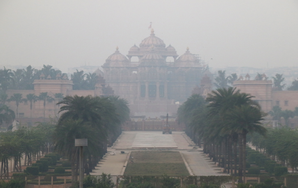New Delhi: A layer of smog covered Delhi-NCR on Saturday morning, with the Air Quality Index (AQI) in the national Capital registering a ‘poor’ rating two days after Diwali celebrations, despite a government-imposed firecracker ban.
According to the Central Pollution Control Board (CPCB), Delhi’s average AQI was 294 at 7:30 A.M. on Saturday, with 18 areas reporting AQI levels above 300, indicating a ‘very poor’ category.
The most affected areas included Anand Vihar (380), IGI Airport (341), RK Puram (340), and Punjabi Bagh (335). Additionally, AQI levels between 200 and 300, indicating ‘poor’ air quality, were recorded in 19 other areas, including Alipur (295), Jawaharlal Nehru Stadium (284), and Mundka (288).
In Delhi’s neighbouring cities, Faridabad in Haryana recorded a ‘moderate’ AQI of 165 while Gurugram recorded a ‘poor’ AQI of 219.
In Uttar Pradesh’s Ghaziabad the AQI was 308 which falls in the ‘very poor’ category, in Greater Noida it was ‘poor’ at 202, and in Noida it touched 250, reflecting similarly ‘poor’ air quality across the region.
On Friday, the air quality in the National Capital Region continued to be a concern as it remained in the ‘very poor’ category a day after the festivities as people in Delhi and neighbouring Noida continued to burst crackers even on Friday night despite the ban on crackers and appeals by the government.
Delhi has seen worsening air quality over recent weeks, largely attributed to stubble burning and low wind circulation.
The Delhi government had imposed a firecracker ban from October 14 through January 1, 2025, and had also deployed 377 enforcement teams to tackle this.
However, many residents reportedly defied the restrictions to celebrate Diwali, contributing to the region’s poor air quality. In response, the government deployed 377 enforcement teams to implement the ban more strictly.
An AQI between zero and 50 is classified as ‘good,’ 51 to 100 ‘satisfactory,’ 101 to 200 ‘moderate,’ 201 to 300 ‘poor,’ 301 to 400 ‘very poor,’ and 401 to 500 ‘severe.’
–IANS


Comments are closed.